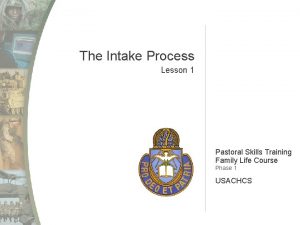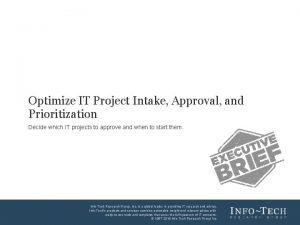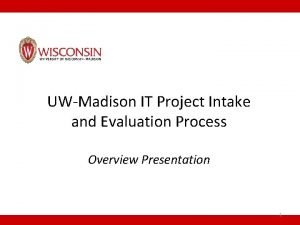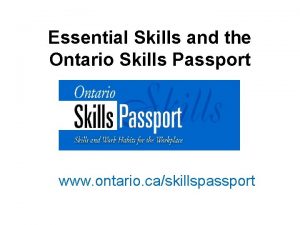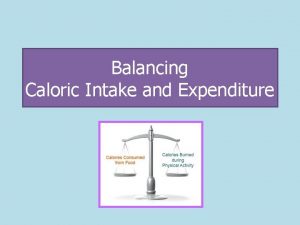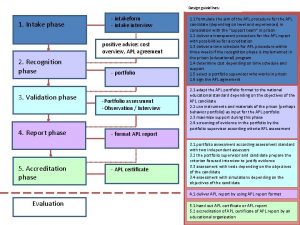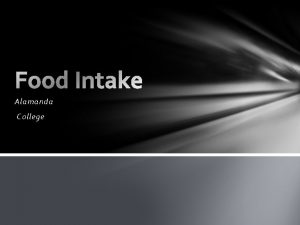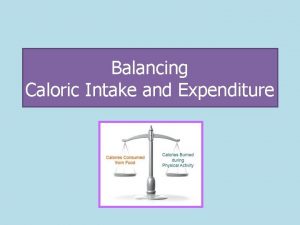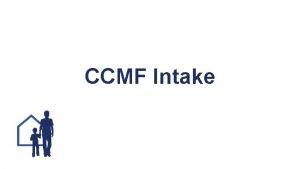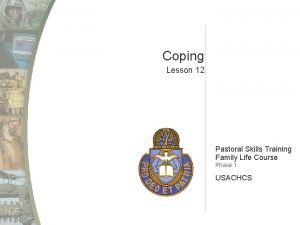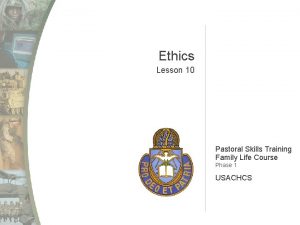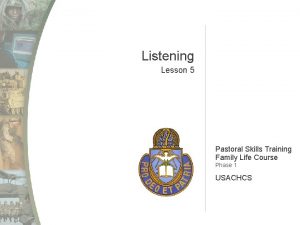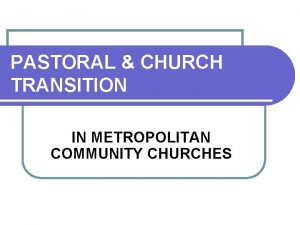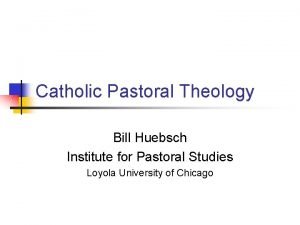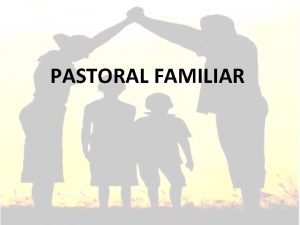The Intake Process Lesson 1 Pastoral Skills Training



























- Slides: 27

The Intake Process Lesson 1 Pastoral Skills Training Family Life Course Phase 1 USACHCS

The Intake Process Objectives Recognize techniques that contribute to a successful intake interview: Identify basic attending skills. Identify the principles of confidential communication. Protect confidentiality as you practice pastoral care and counseling. 2

The Intake Process PART 1: The Initial Interview 3

The Intake Process The Purposeful Interview In any initial interview, perhaps the most important criterion for success is that the participants understand that this is a safe place. The chaplain’s goal is to help the Soldier clarify what the problem is and to find some hope for either fixing or coping with the problem. Communication flows in both directions. Everything the chaplain does conveys to the client what the chaplain thinks is important and related to achieving the client’s goals. The chaplain and the Soldier/family form a team based on mutual trust and cooperation. 4

The Intake Process Attending Behavior Eye contact Attentive body language Vocal style Verbal following Matching behavior 5

The Intake Process Open Invitation to Talk A key task of the interviewer is to encourage the client to speak up, describe the situation, and define the issue. This task includes the use of open-ended questions, for example: Could you tell me a bit more about that? Tell me how you got through that … ? When you say it hurt, what was done to hurt you? 6

The Intake Process Encourage Participation Once the invitation to talk has been extended, additional techniques can keep the client communicating with you. Minimal encouragement Paraphrase Reflection of feeling Probing questions Leverage questions Goal identification 7

The Intake Process Encourage Participation Minimal encouragement Ex: Oh? So? Then what? And? What else? Tell me more … Paraphrase Ex: So what you’re saying is … Ex: Let me tell you what I heard you say … Reflection of feeling Ex: It sounds like you’re feeling sad. Is that what you would call it? 8

The Intake Process Encourage Participation Probing questions Ex: Can you be more specific about how the confrontation started with your boss? Leverage questions Ex: How is this a problem for you? Goal Identification Ex: So your goal is to be able to handle and deal with situations like this one with your boss more effectively. 9

The Intake Process QUESTIONS ? 10

The Intake Process Check on Learning How does paraphrasing improve counselor/client communication? What is the purpose of minimal encouragement? What defines success for an initial interview? What kinds of things might we do to encourage people to speak up? 11

The Intake Process PART 2: Confidentiality 12

The Intake Process Confidential Communication Any communication to a chaplain or chaplain assistant given as a formal act of religion or as a matter of conscience. Communication not intended to be disclosed to third-party persons in any context, legal or otherwise. Privileged Communication Information that is not admissible in a court or legal action Confidential communication is generally considered privileged 13

The Intake Process Sensitive Information Any non-confidential communication that involves personally sensitive information that would be an inappropriate subject for general dissemination Protect as much as possible 14

The Intake Process Foundations of Confidential Communication The greater good of society Supreme Court decisions Military Rules of Evidence 503 Army Regulation 165 -1 15

The Intake Process The Greater Good of Society Certain relationships are protected: Husband/wife Attorney/client Doctor/patient Counselor/client Reason: The potential good that comes from people coming forward and eventually getting help outweighs potential harm or danger from allowing certain relationships to be protected. 16

The Intake Process Supreme Court Decisions The U. S. Supreme Court has recognized “the human need to disclose to a spiritual counsel, in total and absolute confidence, what are believed to be flawed acts or thoughts and to receive priestly consolation and guidance in return. ” Trammel v. U. S. , 445 U. S. 40 (1980) “The privilege regarding communications with a clergyman reflects an accommodation between the public's right to evidence and the individual's need to be able to speak with a spiritual counselor, in absolute confidence, and disclose the wrongs done or evils thought and receive spiritual absolution, consolation, or guidance in return. " U. S. v. Moreno, 20 M. J. 623, 626 (A. C. M. R. 1985) 17

The Intake Process Military Rules of Evidence 503 General rule of privilege: “A person has a privilege to refuse to disclose and to prevent another from disclosing a confidential communication by the person to a clergyman or a clergyman’s assistant, if such communication is made either as a formal act of religion or as a matter of conscience. ” 18

The Intake Process Chief of Chaplains Policy Key Points Confidentiality is absolute: NO STATED EXCEPTIONS. Applies to statements made to chaplains and anyone working for a chaplain. Reveal info ONLY when written consent given. There is no blanket “informed consent” of release from confidentiality. Avoid incompatible tasks (like sexual assault coordinator) where a chaplain might be thought to be required to report something. Protect files, and destroy as soon as no longer needed. The relationship between a chaplain, assistant, and supervisors is NOT confidential. 19

The Intake Process General Rules Until you know otherwise, assume that the person considers this to be a matter of religion or conscience and intends this to be confidential. It is his/her intention, not your theology, that determines whether this is confidential or not. This is not a lawyer’s call. Do not speak even if a lawyer suggests that it isn’t confidential. Unless you are absolutely sure something is not confidential, do not speak. 20

The Intake Process Exceptions Person voluntarily waives confidentiality: Not coerced Signed, dated, and witnessed Must be given AFTER the information is shared Conscientious Objector interview: AR 600 -43, 2 -3 (a) specifically states that the information provided to the chaplain conducting the investigation is not privileged. However, ensure Soldiers understand this before beginning an interview. (This is a specialized case. ) There are no other exceptions. Confidentiality is absolute, regardless of the severity of the situation. 21

The Intake Process Severe Situations If anyone is in immediate danger, do everything possible to immediately lower the risk of harm to others or the individual. Contact your chaplain supervisor for advice. Contact the family life chaplain. Encourage the individual to take appropriate actions to resolve the situation. But even in severe situations, DO NOT break confidentiality without a waiver. 22

The Intake Process Confidential Communication With Chaplain Personnel Communications regarding constituents: Chaplains often consult with supervisory chaplains to ensure best care. When a chaplain consults with her/his supervisor regarding a parishioner, confidentiality extends to the supervisor. Privilege DOES NOT exist between a chaplain and a chaplain assistant or a chaplain supervisor when discussing personal and professional issues. Policy that governs confidential communication DOES NOT apply to chaplain candidates. 23

The Intake Process Confidential or Not? Scenario 1: Sergeant calls chaplain in: “I think PVT Jones is suicidal: Can you talk with him and tell me what is happening? ” Scenario 2: Unit chaplain calls state support chaplain who is seeing a Soldier in unit chaplain’s battalion. He asks: “Are you seeing Jones? Is Jones suicidal? ” Does the state support chaplain tell the unit chaplain? Scenario 3: What about taping counseling or doing a verbatim for CPE training, or to consult with a family life chaplain? Scenario 4: During marriage counseling, the wife tells the chaplain: “My husband hit our child and caused bruises. ” Is the information still protected even though there is a third person (wife and husband counselor) in the room? 24

The Intake Process Confidential or Not? Scenario 5: Commander asks: “Chaplain, I’m not going to prosecute Jones, so this isn’t a legal issue. I don’t think it’s privileged, I just want to help. Tell me what’s happening in his marriage. ” Scenario 6: Soldier tells you: “I hate SGT Johnson, and have thought about killing him at the range tomorrow. ” Scenario 7: Social worker tells you: “In this state, clergy are mandated reporters of child abuse and elder abuse. I need to know if Mr. Jones has admitted to you that he hit his children. ” Scenario 8: Chaplain: “My denomination/endorser requires me to report in cases of child/sexual abuse” or “I am a licensed therapist. The code of ethics requires me to report. ” 25

The Intake Process Confidential or Not? Scenario 9: Wife in counseling (just chaplain and wife): “My husband has been having sex with our 12 -year-old daughter. He’ll kill me if he thinks I reported him. Will you go to the police and report this to them? ” Scenario 10: Soldier tells you information in a corner of a crowded room. Is that privileged? 26

The Intake Process QUESTIONS ? 27
 Training intake process
Training intake process Pastoral conversation
Pastoral conversation Zeta phi beta shield meaning
Zeta phi beta shield meaning Project intake process presentation
Project intake process presentation Intake process for project demand management
Intake process for project demand management Alpha kappa alpha membership intake process manual
Alpha kappa alpha membership intake process manual Invitation alpha kappa alpha mip timeline
Invitation alpha kappa alpha mip timeline Intake water treatment process
Intake water treatment process Project intake process presentation
Project intake process presentation Interpersonal intrapersonal skills
Interpersonal intrapersonal skills Soft skill
Soft skill Ontario skills passport essential skills
Ontario skills passport essential skills Hát kết hợp bộ gõ cơ thể
Hát kết hợp bộ gõ cơ thể Ng-html
Ng-html Bổ thể
Bổ thể Tỉ lệ cơ thể trẻ em
Tỉ lệ cơ thể trẻ em Gấu đi như thế nào
Gấu đi như thế nào Glasgow thang điểm
Glasgow thang điểm Chúa sống lại
Chúa sống lại Kể tên các môn thể thao
Kể tên các môn thể thao Thế nào là hệ số cao nhất
Thế nào là hệ số cao nhất Các châu lục và đại dương trên thế giới
Các châu lục và đại dương trên thế giới Công thức tính độ biến thiên đông lượng
Công thức tính độ biến thiên đông lượng Trời xanh đây là của chúng ta thể thơ
Trời xanh đây là của chúng ta thể thơ Mật thư tọa độ 5x5
Mật thư tọa độ 5x5 Phép trừ bù
Phép trừ bù Phản ứng thế ankan
Phản ứng thế ankan Các châu lục và đại dương trên thế giới
Các châu lục và đại dương trên thế giới
